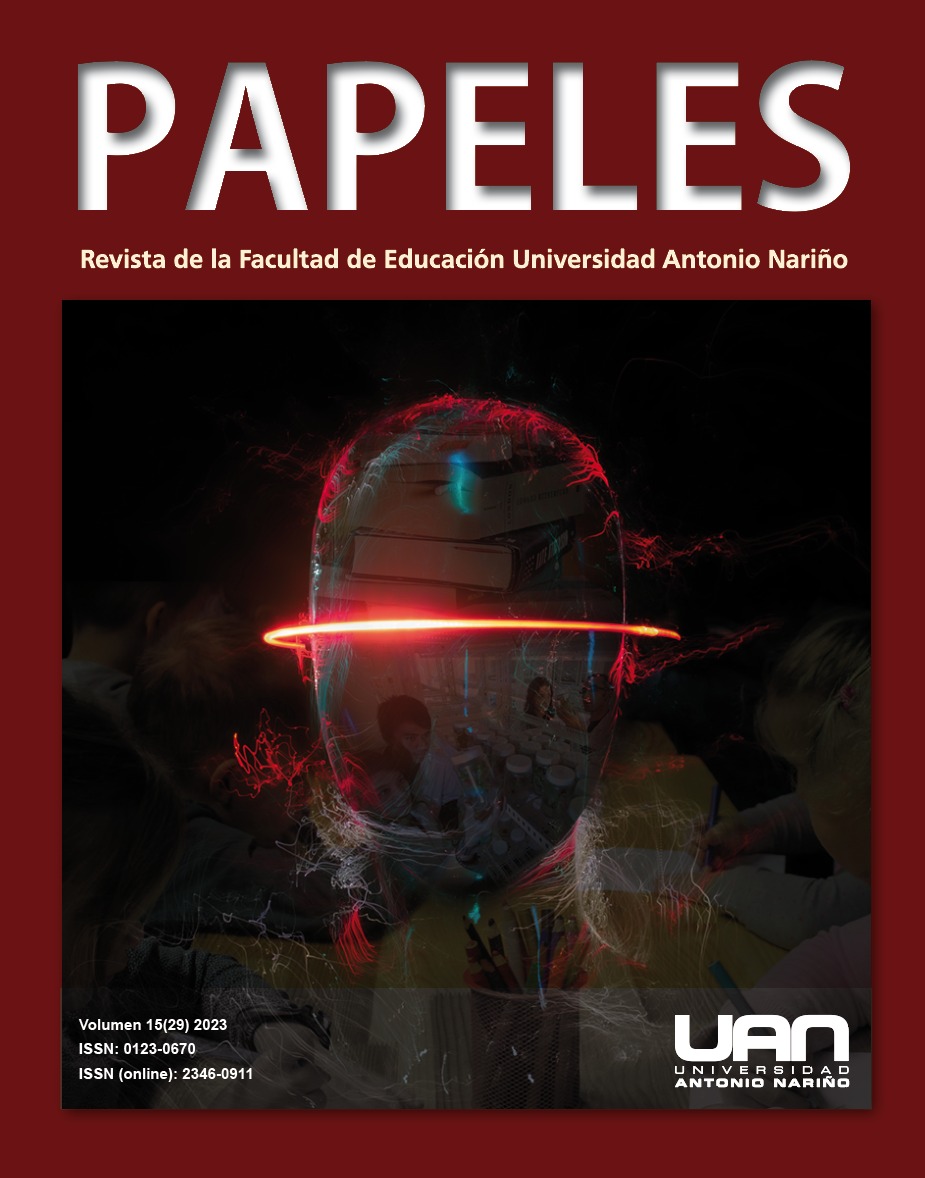Towards a Teaching-learning Process with a Holistic Vision
DOI:
https://doi.org/10.54104/papeles.v15n29.1304Keywords:
teaching, learning, students, university, interdisciplinaryAbstract
Introduction: The scientific-technical development, at present, requires profound changes in higher education, so the teaching-learning process needs a holistic vision to favor the integral formation of university students, however, in educational practice they have been detected. insufficiencies since there is a tendency towards a disciplinary approach; for which the investigative work has focused on the following question: How to favor the integral formation of university students through a holistic vision in the teaching-learning process? Consequently, the objective has been set: to socialize a didactic strategy, made up of integrating teaching tasks, that favor the treatment of a holistic vision of the teaching-learning process to contribute to the integral formation of students. Methodology: The research has followed a qualitative perspective, carrying out a descriptive study on the essential features of the object, through the use of methods of the theoretical and empirical level, necessary to prepare the theoretical framework, analyze the current state of the object, elaborate the solution proposal to the problem and the conclusions. Results and discussion: The results obtained show difficulties in establishing links between the content studied and previous and subsequent knowledge, its generalizing analysis is not encouraged, it is fragmented into its different manifestations, which does not favor its global understanding. Conclusions: It is concluded that it is necessary to assume a holistic vision in the teaching-learning process, through integrating teaching tasks, which enriches the process, establishing deep relationships and interrelationships between different fields of knowledge, providing solidity to student learning.
Downloads
References
Arce Rojas, R. S. (2020). Convergencias y diferencias entre el pensamiento complejo y la ecología de saberes. Sophia, Colección de Filosofía de la Educación, 29, 69-91. https://doi.org/10.17163/soph.n29.2020.02
Ayala Rueda, C. I. y Dibut Toledo, L. S. (2020). La actualización curricular como estrategia para la formación integral de estudiantes. Conrado, 16(75), 93-102. https://conrado.ucf.edu.cu/index.php/conrado/article/view/1391/1381
Becher, Y., Juliá, M. y Neme, A. (2022). Una experiencia de enseñanza del derecho desde un enfoque complejo y transdisciplinar. Saberes y prácticas: Revista de Filosofía y Educación, 7(1), 1-9. https://doi.org/10.48162/rev.36.046
Bonet Avilés, L., Garcés Llauger, S. y Briñones Fernández, A. (2021). Aplicación del b-learning a través de una metodología para la dinámica de las relaciones interdisciplinarias. Redel: Revista Granmense de Desarrollo Local, 5(2), 169-184. https://revistas.udg.co.cu/index.php/redel/article/view/2540/4861
Castro Martínez, E. de J. (2021). Notas metodológicas en las postulaciones teóricas de Henri Lefebvre. Geousp, 25(1), e-166111. https://doi.org/10.11606/issn.2179-0892.geousp.2021.166111
Colina Vargas, A. M. (2020). La educación superior desde la visión del pensamiento complejo. Revista Científica Ecociencia, 7, 1-18. https://doi.org/10.21855/ecociencia.70.288
Crespo-Berti, L. A., Hernández Infante, R. C. e Infante Miranda, M. E. (2019). Prácticas asistidas enfocadas en la formación de los estudiantes: Experiencias en Uniandes, Ecuador. Revista Espacios, 40(8), 8-14. http://www.revistaespacios.com/a19v40n08/a19v40n08p08.pdf
Flores Morales, J. A. (2020). Pensamiento complejo: Una revisión sistemática de artículos científicos indexados en Scopus 2016-2019. Phainomenon, 19(2), 303-324. https://doi.org/10.33539/phai.v19i2.2274
González Barroso, M. M., Perandones Lozano, M. y Rodríguez Lorenzo, G. A. (2016). Estrategias expresivas, interdisciplinariedad y convivencia desde la Educación Musical II. Dedica: Revista de Educação e Humanidades, 10, 243-268. https://digibug.ugr.es/bitstream/handle/10481/41954/GonzalezBarroso_ConvivenciaMusica.pdf?sequence=1&isAllowed=y
Hernández Infante, R. C. y Infante Miranda, M. E. (2017a). Aproximación al proceso de enseñanza-aprendizaje desarrollador. Revista Episteme, 4(3), 1-11. http://45.238.216.13/ojs/index.php/EPISTEME/article/view/642/302
Hernández Infante, R. C. y Infante Miranda, M. E. (2017b). Movimiento y aprendizaje en el desarrollo de competencias. Revista Cuadernos Fronterizos, 40(13), 41-43. https://erevistas.uacj.mx/ojs/index.php/cuadfront/article/view/1796/1581
Hernández Infante, R. C. y Infante Miranda, M. E. (2017c). La clase en la educación superior, forma organizativa esencial en el proceso de enseñanza-aprendizaje. Educación y Educadores, 20(1), 27-40. https://doi.org/10.5294/edu.2017.20.1.2
Llano Arana, L., Gutiérrez Escobar, M., Stable Rodríguez, A., Núñez Martínez, M., Masó Rivero, R. y Rojas Rivero, B. (2016). La interdisciplinariedad: Una necesidad contemporánea para favorecer el proceso de enseñanza aprendizaje. Medisur, 14(3), 320-327. https://medisur.sld.cu/index.php/medisur/article/view/3289/2081
Majin Ceron, I. G., Rivera Diego, D. A. y Pinto, M. (2020). Restauración ecológica: Una aproximación a la integración de conocimientos en la escuela. Revista Electrónica EDUCyT, 11(Extra), 1353-1363. https://die.udistrital.edu.co/revistas/index.php/educyt/article/view/137/129
Mondino, G. M. (2021). Contribuciones para un análisis de la universidad desde el pensamiento complejo. Enfoques, 33(1), 41-63. https://publicaciones.uap.edu.ar/index.php/revistaenfoques/article/view/996
Montenegro Castro Martínez, W. (2021). La educación del siglo XXI: Un proceso de formación integral de la persona humana. Cultura, 35, 107-131. https://doi.org/10.24265/cultura.2021.v35.07
Nivela-Cornejo, M. A., Morales-Caguana, E. F. y Rivero-Villareal, V. S. (2020). Construcción del conocimiento tecnológico con la metodología holística. Dominio de las Ciencias, 6(3), 412-421. http://dx.doi.org/10.23857/dc.v6i3.1405
Ostalé, J. (2014). El hombre es la medida de todas las cosas. http://unedfilosofia.wordpress.com.
Priscal Palacios, R. (2021). La subversión tecnológica de la vida cotidiana: Un análisis desde el pensamiento complejo de Morin. Ciencia Latina: Revista Científica Multidisciplinar, 5(1), 436-458. https://doi.org/10.37811/cl_rcm.v5i1.242
Rodríguez Torres, Á. F., Naranjo Pinto, J. A., Cargua García, N. I., Bustamante Torres, J. P. y Chasi Solórzano, B. F. (2021). La percepción de los estudiantes universitarios en relación con el trabajo interdisciplinario. Revista Espacios, 42(11), 47-58. DOI: 10.48082/espacios-a21v42n11p06
Torres Triana, A. M. y Blanco Alarcón, L. A. (2021). Visión epistemológica del enfoque holístico y sistémico en los estudios organizacionales. Revista Scientific, 6(19), 43-63. https://doi.org/10.29394/Scientific.issn.2542-2987.2021.6.19.2.43-63
Universidad Regional Autónoma de los Andes. (2017). Modelo educativo: Pedagógico, curricular, de investigación y de prácticas preprofesionales.
Valle García, M. del. (2014). Las tareas docentes como un recurso para lograr la solidez de conocimientos y habilidades. Ministerio de Educación Superior.
Downloads
Published
-
Abstract899
-
PDF (Español)413
How to Cite
Issue
Section
Categories
License
Copyright (c) 2022 Doctor, Maria Elena Infante Miranda, Doctora

This work is licensed under a Creative Commons Attribution-NoDerivatives 4.0 International License.






